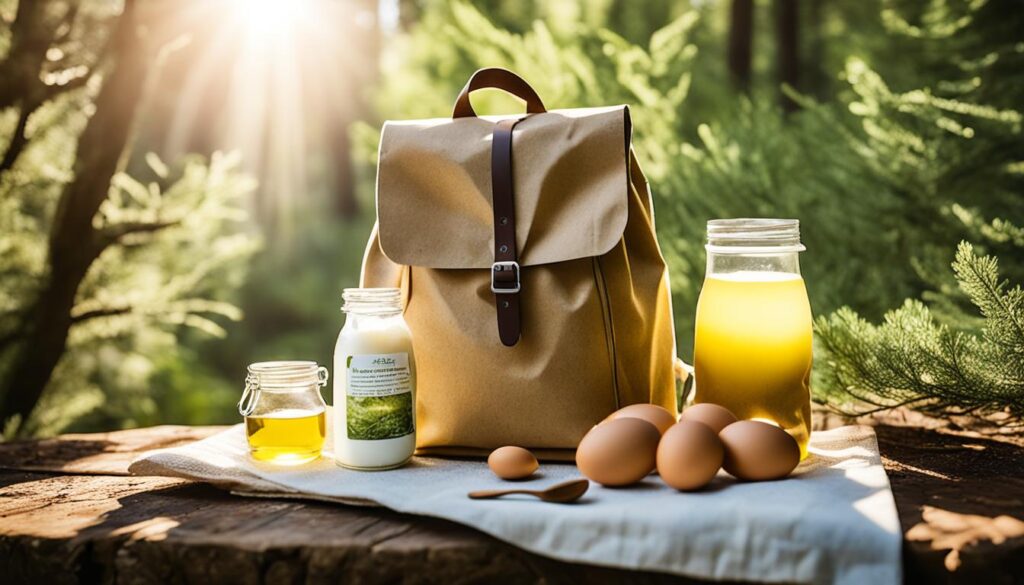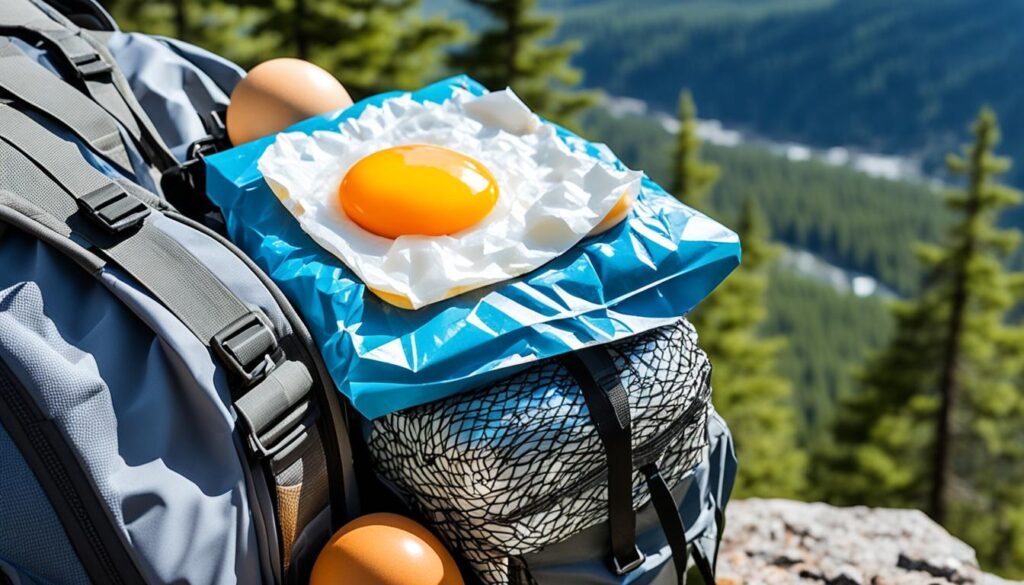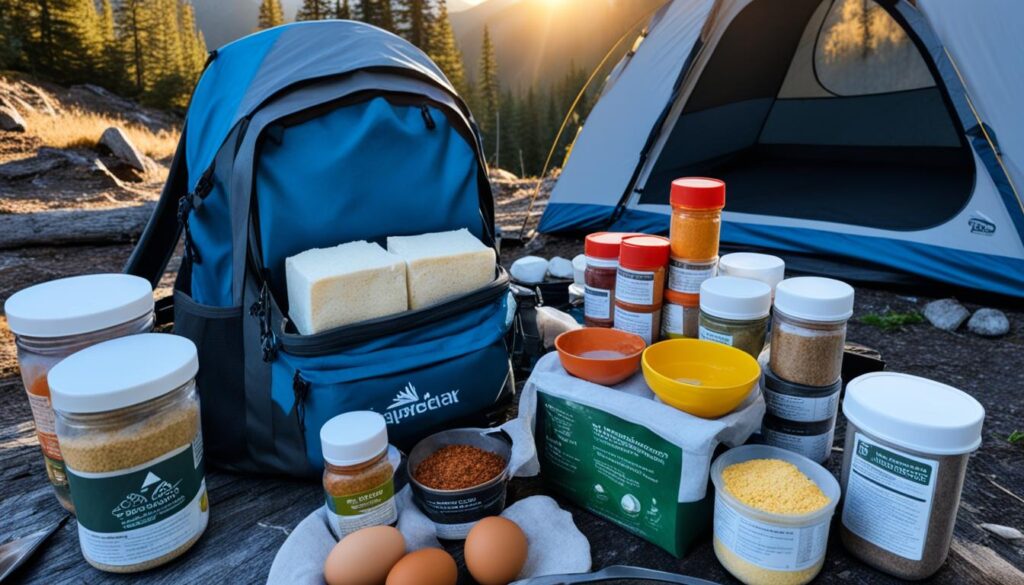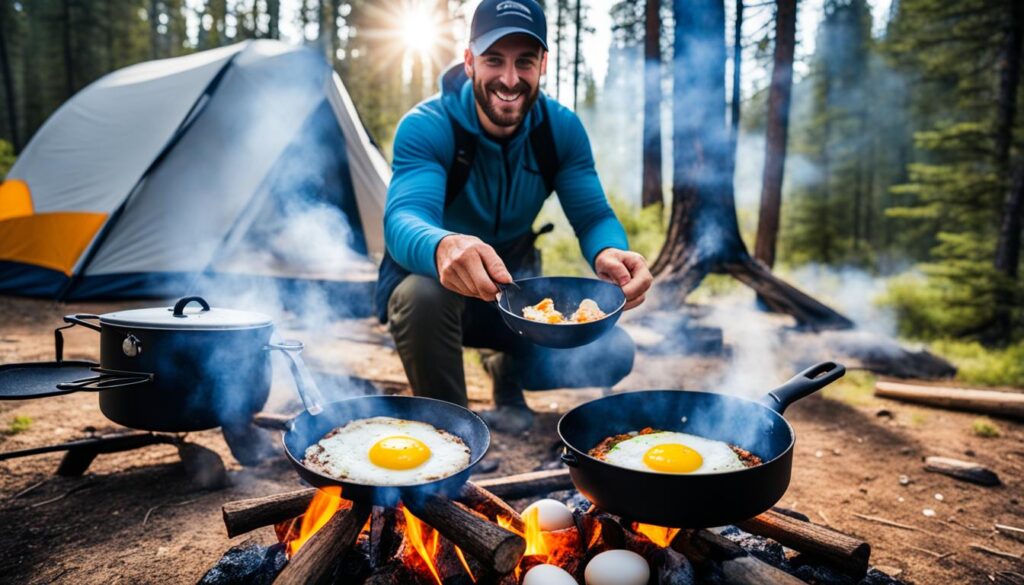Taking eggs camping doesn’t have to be a hassle. With these safe and easy methods, you can enjoy a delicious campfire breakfast with eggs every time. Whether you prefer whole eggs, cracked eggs, powdered eggs, or hard-boiled eggs, there’s a method that suits your camping needs. Keep reading to discover the best ways to pack and store eggs while camping.
Key Takeaways:
- Learn how to take eggs camping without breaking them or compromising freshness.
- Explore different methods for packing whole eggs, cracked eggs, and powdered eggs.
- Ensure proper storage and handling of eggs to prevent food poisoning.
- Discover delicious egg recipes for your campfire breakfast.
- Create a memorable camping experience with safe and easy egg cooking techniques.
One option for taking eggs camping is to pack whole eggs. It’s a convenient way to have fresh eggs on hand for cooking while enjoying the great outdoors. There are a few methods you can use to pack whole eggs safely and prevent them from breaking.
If you prefer using egg holders or egg cartons, choose ones with individual slots for each egg. This will help prevent them from bumping into each other and breaking. Secure the carton or holder to prevent any movement during transportation.
Another option is to use a wide-mouth water bottle to pack the eggs. This method is especially useful if you want to save space in your camping gear. Simply crack the eggs into the water bottle, making sure to close the lid tightly. This will keep the eggs intact and separate from other items in your backpack or cooler.
In addition to using egg holders or water bottles, you can add an extra layer of protection by wrapping the eggs with bubble wrap. This will cushion the eggs and provide further insulation against any potential impact or temperature changes.
How to Cook Whole Eggs While Camping
When it’s time to cook your packed whole eggs, you can simply crack them into a pan and fry them. This method is best for those who enjoy having whole, fried eggs while camping. The eggs should be safe to eat as long as they have been stored properly and not exposed to extreme temperatures.
If you’re looking for a delicious and portable camping breakfast recipe using whole eggs, consider making an egg sandwich. It’s a simple and satisfying choice that will keep you energized for outdoor activities. Just toast some bread, add a fried egg, and any desired toppings like cheese or bacon. It’s a hearty meal that will start your day off right.
Remember to clean up properly after cooking and dispose of any eggshells responsibly. Keeping a supply of disposable wipes or biodegradable soap will help you maintain cleanliness and hygiene while camping.

“Packing whole eggs for camping is a great way to have a nutritious and protein-packed meal while enjoying the great outdoors. With the right egg holders or wide-mouth water bottles, you can ensure your eggs arrive safely at the campsite.”
Packing Cracked Eggs for Camping
When it comes to packing eggs for camping, cracked eggs can be a convenient option. By cracking the eggs into an airtight container, such as a mason jar or water bottle, you can protect them from breaking during transportation. The use of airtight containers ensures that the eggs stay fresh and intact until you’re ready to use them. Remember to seal the container tightly to prevent any leaks or messes in your cooler or backpack.
If you prefer scrambled eggs, you can give the container a good shake or stir before heading to the campsite. This will save you time and effort when it’s time to cook. Another option is to pre-season the cracked eggs with salt and pepper, allowing you to add some flavor to your scrambled eggs without any additional hassle.
Liquid eggs are also a great alternative for camping. By using liquid eggs, you eliminate the risk of shells breaking and minimize the clean-up process. Simply pour the liquid eggs into the airtight container and seal it tightly. This method is especially useful if you’re planning to make scrambled eggs or use the liquid eggs as an ingredient in other campfire recipes.
Remember, whether you’re using cracked eggs or liquid eggs, it’s essential to store them in an airtight container to maintain their freshness and prevent any cross-contamination with other food items in your cooler or backpack.

Tips for Packing Cracked Eggs:
- Choose airtight containers like mason jars or water bottles to protect the eggs from breaking during transportation.
- Give the container a good shake or stir if you plan to make scrambled eggs.
- Pre-season the cracked eggs with salt and pepper for added flavor.
- Consider using liquid eggs for easier transportation and minimal clean-up.
- Seal the containers tightly to prevent leaks or messes in your cooler or backpack.
By following these tips, you can enjoy the convenience of packing cracked eggs for camping without worrying about broken shells or spoilage. So go ahead and add this option to your camping checklist for a tasty and hassle-free outdoor cooking experience!
Packing Powdered Eggs for Camping
If you’re looking for a non-perishable option, powdered eggs are a great choice for camping. Not only do they have a long shelf life, but they also don’t require refrigeration, making them convenient for outdoor adventures where coolers may not be easily accessible.
To use powdered eggs while camping, simply rehydrate them with water when you’re ready to cook. Follow the instructions on the packaging, but as a general rule, you’ll typically need to mix 2 tablespoons of powdered eggs with 4 tablespoons of water to equal one fresh egg.
Once rehydrated, you can use powdered eggs to create a variety of delicious camping meals. They work well in breakfast hash, providing a protein-packed addition to potatoes and veggies cooked over the campfire. You can also use them to make fluffy french toast or creamy scrambled eggs that are perfect for a filling and satisfying breakfast on the go.
Here’s a simple recipe for scrambled eggs using powdered eggs:
Powdered Egg Scramble
- 1/2 cup powdered eggs
- 1 cup water
- Salt and pepper to taste
- Optional: chopped vegetables, cheese, or cooked bacon
- In a bowl, whisk together powdered eggs, water, salt, and pepper until well combined.
- Heat a pan over medium heat and add the egg mixture.
- Cook, stirring occasionally, until the eggs are fully cooked and scrambled.
- Optional: Add vegetables, cheese, or cooked bacon to customize your scramble.
- Serve hot and enjoy!
| Benefits of Packing Powdered Eggs for Camping | Things to Consider |
|---|---|
|
|
With powdered eggs, you can enjoy the convenience of having eggs on your camping trip without worrying about them spoiling or breaking during transport. They are a reliable and practical option for any outdoor enthusiast looking to add protein and flavor to their campfire meals.

Tips for Storing and Handling Eggs While Camping
Proper storage and handling of eggs while camping is crucial to prevent bacterial growth and food poisoning. To ensure the freshness of your eggs, it’s important to keep them at a temperature between 32°F and 40°F. The best way to achieve this is by using a cooler with ice packs or freezer packs to keep the eggs cool during your trip.
When packing your cooler, make sure to place the eggs in a secure container to prevent them from getting crushed or damaged. You can use an egg carton or an airtight container specifically designed for storing eggs. This will help maintain their integrity and protect them from any potential breakage.
It is also important to dispose of eggshells properly while camping. Not only can discarded eggshells attract wildlife, but they can also create a mess and an unpleasant odor. To follow proper camping etiquette, either bury the eggshells in a hole at least 6 inches deep or seal them in a plastic bag and put them in the trash.
Lastly, don’t forget to bring along cleaning supplies to handle any spills or leaks from broken eggs. Hygiene is crucial when handling raw eggs, and having the necessary cleaning supplies, such as soap, water, and disposable wipes, will ensure that you can maintain a clean and safe cooking environment throughout your camping trip.
FAQ
How can I pack whole eggs for camping?
You can pack whole eggs for camping by using an egg holder or egg carton with individual slots for each egg or by wrapping them with bubble wrap to provide added protection. Another option is to crack the eggs into a wide-mouth water bottle.
How do I cook whole eggs while camping?
To cook whole eggs while camping, simply crack the eggs into a pan and fry them. This method is best for those who prefer whole, fried eggs over scrambled ones.
Can I pack cracked eggs for camping?
Yes, you can pack cracked eggs for camping by cracking them into an airtight container like a mason jar or water bottle. Pre-seasoning with salt and pepper is also an option if you plan to make scrambled eggs.
How do I cook cracked eggs while camping?
To cook cracked eggs while camping, simply crack the eggs into a pan and scramble them. Liquid eggs are easier to transport and eliminate the risk of shells breaking.
Can I pack powdered eggs for camping?
Yes, you can pack powdered eggs for camping. They are a non-perishable option that can be easily rehydrated with water when you’re ready to cook. They are perfect for making breakfast hash, french toast, or scrambled eggs.
How do I rehydrate powdered eggs while camping?
To rehydrate powdered eggs while camping, simply mix the powder with water according to the instructions on the package. Then, cook as you would with regular eggs.
How should I store and handle eggs while camping?
Eggs should be kept between 32° – 40°F to maintain their freshness. Use a cooler with ice packs or freezer packs to keep the eggs cool during your trip. Dispose of eggshells properly to avoid attracting wildlife. Bring cleaning supplies to handle any spills or leaks from broken eggs and to maintain hygiene while cooking and handling raw eggs.






